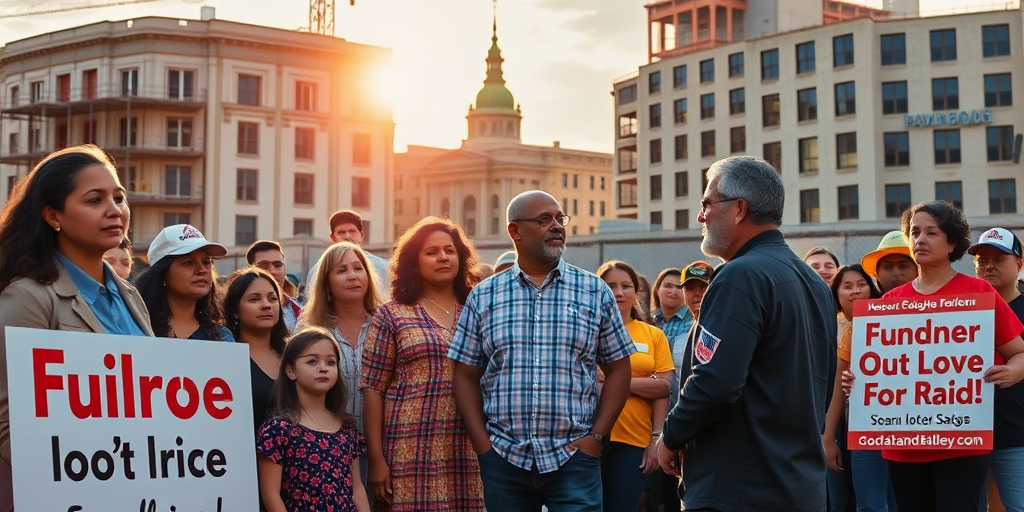Families Struggle with Legal Costs Following Florida ICE Raid
Families across Florida are grappling with the severe emotional and financial burdens following a large-scale ICE raid at a Tallahassee construction site. Several individuals, including Jose Padron, were detained and moved to detention centers far from their homes. This situation has left families scrambling to secure legal representation as detainees are relocated to various facilities, complicating communication and complicating their legal battles.
The Sweeping Impact of the Raid
When ICE officers descended upon a construction site in Tallahassee on May 29, 2023, tensions soared as workers were detained and transported to detention centers, including the Rio Grande Detention Center in Laredo, Texas. The raid intensified pressures on families like Britney Padron’s, as her father, Jose Padron, was sent miles away, drastically complicating efforts to reunite.
Loved ones now face steep legal fees, with firms charging between $3,500 and $5,500 to handle cases. The situation is compounded by initial consultation fees ranging from $300 to $900, financial hardships that are overwhelming families trying to secure the freedom of their detained relatives.
Britney Padron illustrates these challenges, highlighting efforts like setting up GoFundMe campaigns to manage costly fees. “I just want my dad back home,” she said, articulating the desperate struggle for many families in similar circumstances.
Challenges in Locating Detainees
The raids have not only taken an emotional toll but also exposed the deficiencies of ICE’s communication systems. Family members, including Britney, struggle to locate detainees. The Online Detainee Locator System has proved unreliable, listing only broad locations like “Texas,” making it hard for families to access precise details about their loved ones.
“I finally heard from my dad, but only for three minutes,” Britney shared. “Every call we get is brief, leaving us anxious and yearning for more information.”
Such disjointed communication exacerbates anxiety among families. Amanda Parrish, another affected family member, waited days for contact from her husband, who was also transported to the Rio Grande Processing Center. Despite an active I-130 petition approved as part of his ongoing application for citizenship, he was caught up in the dragnet.
“This should not have happened,” Parrish lamented, expressing the shared frustration of those entangled in these complicated processes.
Financial Strains Force Fundraising Efforts
For many, fundraising has become a necessary recourse. Detained individuals’ families, like Hilda Castro, are pleading for public support to meet exorbitant legal costs. With her husband detained despite their legitimate I-130 application pending, Castro now faces an uphill battle to raise the necessary funds, having so far received no donations.
Authorities have urged caution when it comes to making hasty decisions under duress, such as signing self-deportation paperwork. Families like Castro’s advocate against such measures, promoting the importance of legal counsel despite the apparent financial strain.
Local Impact on the Rio Grande Valley
For Valley residents, this incident resonates deeply with ongoing immigration issues prevalent in South Texas. The Rio Grande Valley, a border region steeped in immigration complexities, mirrors these challenges as communities confront similar raids and detentions.
Local experts reflect on the importance of awareness and preparation. Daniel Ortega, a community leader in McAllen, observes, “The Valley shares the burden of these national immigration policies. Detentions affect us all, tearing at the fabric of our community.”
Ortega advocates for increased local support systems that can provide legal assistance to families in need, focusing on how the RGV community can unify in times of crisis.
Looking Forward and Learning from the Past
While navigating the legal end of this issue remains daunting for those affected, the situation impels greater scrutiny and adaptive measures locally. Reevaluating how information is shared and ensuring detainees’ rights within these systems are crucial steps in promoting justice.
The ongoing narrative emphasizes a shared responsibility to ensure transparency and reform effective assistance for those detained. Education, legal aid resources, and community outreach form the bedrock of a compassionate response, reminding us of our collective power to advocate and aid those in need.
Given these complex issues, commissioners and local leaders urge residents to engage through public forums, conveying their perspectives and expectations. Meanwhile, forthcoming regulations or policy changes require thorough public discourse to bridge disconnects between enforcement and empathy.
Resources, such as legal advisory networks and community-led initiatives, offer actionable ways to support affected families. For more information or assistance, residents can contact local advocacy groups that specialize in immigration law and public policy affected by federal immigration action.
In this way, the Rio Grande Valley continues to confront national challenges with courage and coordination, underscoring its core values of resilience and community.







